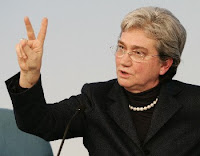 Yesterday, along with many other commentators, I argued that what happened to Berlusconi in Milan was strictly correlated to the political hatred which is intoxicating the public debate in Italy. (Silvio Berlusconi himself, reportedly, had a premonition that he would be attacked: In fact, he confided to Paolo Bonaiuti, his spokesman, on the way to Piazza del Duomo that he feared “something might happen” because of the “climate of hate” against him.)
Yesterday, along with many other commentators, I argued that what happened to Berlusconi in Milan was strictly correlated to the political hatred which is intoxicating the public debate in Italy. (Silvio Berlusconi himself, reportedly, had a premonition that he would be attacked: In fact, he confided to Paolo Bonaiuti, his spokesman, on the way to Piazza del Duomo that he feared “something might happen” because of the “climate of hate” against him.)I also mentioned a shameful comment made by Antonio Di Pietro, the head of a small opposition party (Italy of Values), soon after the attack. Fortunately Pierluigi Bersani, head of the main opposition party (PD), said the attack was an “unspeakable gesture” that must be firmly condemned, without ‘ifs’ and ‘buts’. And the same was the case with Pier Ferdinando Casini, leader of another opposition party, the centrist Union of Christian Democrats. But there was no doubt about their political balance, personal integrity, and good taste, too.
Unfortunately, the number two of Bersani’s party, Rosi Bindi, in an interview (in Italian) with the newspaper La Stampa suggested that “while these violent acts should always be condemned, sometimes they can be explained […]. The fact remains that one of the architects of this political climate is Berlusconi: he cannot play the victim.” This woman, for those who don’t know her yet (don’t worry, you didn’t miss anything), is a former Catholic activist, with decades of experience in the late DC (Christian Democratic party). In other words she embodies the kind of Italian Catholic towards whom the late Communist Party—from which Bersani’s Democratic Party descends—always showed great respect and a fatal attraction (often reciprocal).
As it was not enough, to get an idea of the political climate, Monday afternoon in Italy—less than 24 hours after the attack—more than 63,000 people had registered as fans of a Facebook page created for Massimo Tartaglia, the insane man (he has received treatment for mental health issues for the last ten years) who hit Berlusconi. While I am writing the number of fans has increased to 78,879.
This is the state-of-the-art in Italy. Of course the leftists try to justify themselves by saying that “democracy is in danger in Italy,” but this is a huge hoax, as Angelo Panebianco—one of the most prominent Italian scholars of political science—wrote in his October 19, 2009, memorable editorial in the Corriere della Sera newspaper which was made available here in English translation. “We are immersed in a virtual civil war,” he wrote…
We are, even with our faults, a democracy, yet a considerable amount of thinkers from other countries, provoked by our demagogues, need to explain to us that we are subject to a dictatorship. We have completely open public debate, yet there are others who say that the freedom of the press is threatened. Some even speak of Italy as though it were Iran or Burma. We have free and regular elections but a large proportion of electors of the defeated alliance don’t recognize the legitimacy of the government in office (but certain electors of the actual majority did the same thing when the opposition was governing).
These are suitable moments to return to “fundamentals:” What permits a democracy to survive? With what virtues or qualities must democratic citizenship be endowed with? Democracy is a moderate regime. To be guided it always needs moderate forces of government, of right or left wing, and that the extremist components are kept at bay.
Yes, we need “that the extremist components are kept at bay.” And that’s the main problem with the left in this country. A problem of “leadership” and, perhaps, above all a problem of the “people of the left.”